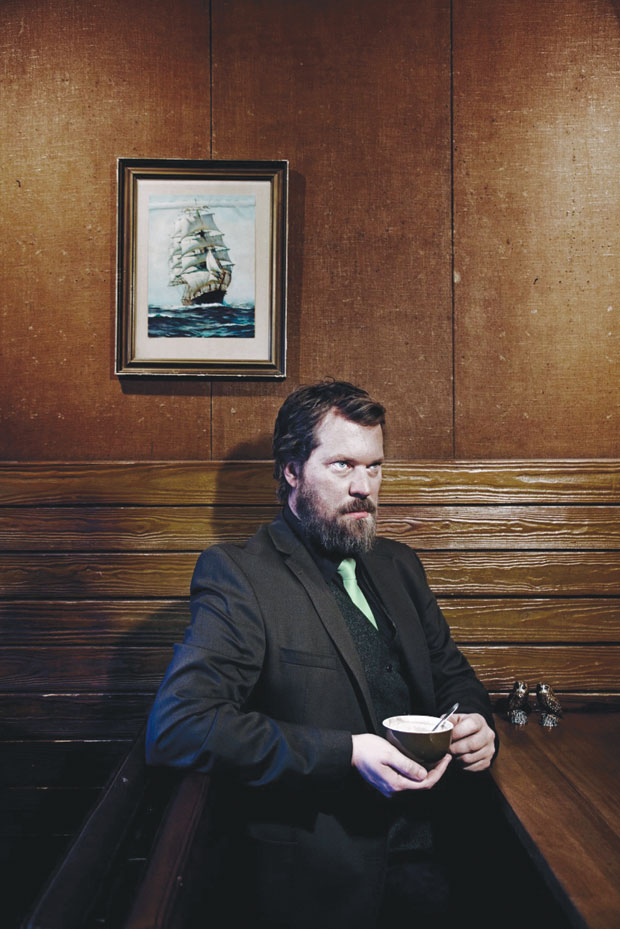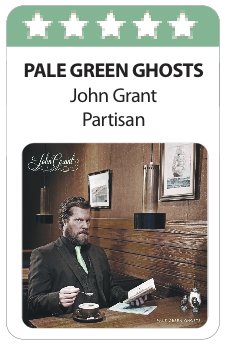John Grant’s sophomore CD ‘Pale Green Ghosts’ brilliantly speaks to what 40something gay men have on their minds

THE FIRST TWINK? | The ivory-skinned youth in Caravaggio’s painting of St. Francis has evoked images of homoeroticism in the painter’s work for centuries. (Courtesy Kimbell Art Museum)
RICH LOPEZ | Contributing Writer
getrichindallas@gmail.com
Some albums you simply listen to; but others need unpacking. Their gratification seeps in by osmosis rather than striking fast, grabbing your ear with a catchy hook.
After the unpacking, you sit in silence thinking about what you just heard, rolling it over again and again.
That’s the experience John Grant delivers on his second full-length CD, Pale Green Ghosts, which may be the greatest gay album of all time.
That’s a bold statement, but hard won. Grant’s figurative voice is that of a 43-year-old gay man who shuns abstraction turning instead to brutal honesty. He basks in middle-age, and the wisdom that comes with it. In Ghosts, his frankness is mind-blowing — sometimes bitter to swallow but always poetic. He sings about himself but his perspective is on the pulse of what gay men experience.
Grant’s second solo effort is a far cry from his acclaimed Queen of Denmark, which was recorded in Texas with Denton band Midlake. But it’s still Grant’s unique voice.
He leans to the electronic a bit with a pulsing texture to the opening title track. The result is a hypnotic beat that earworms in without complaint.
His biographical tale about driving to Denver clubs from his small town is as dark as those late night roads. He goes in for the kill with “Black Belt,” which, along with “Sensitive New Age Guy,” is the closest bit to a club tune on here. He calls out artificial queens for their shallow ‘tudes with you are supercilious, pretty and ridiculous / you got really good taste / you know how to cut and paste.
 Oh, snap! But what makes the song worth everything is the rare (if not absolutely unique) use of “Callipygian” in his lyrics. (Look it up.)
Oh, snap! But what makes the song worth everything is the rare (if not absolutely unique) use of “Callipygian” in his lyrics. (Look it up.)
Grant admits feelings that can’t be easy to put on paper let alone set to music. But he fearlessly reflects much of what likely any gay man has felt at some point. His insecurity in relationships is astonishingly painful when he sings the knowledge that I can’t be what you need / is cutting off my air supply in “Why Don’t You Love Me Anymore?” In “It Doesn’t Matter To Him,” Grant can recognize his personal triumphs but they all get trumped when he got himself evicted / from his hear from one day to the next. These are potent feelings, and while they might sound like Debbie Downer, the delivery is authentic and not overly sad, playing as philosophical and pensive. Then he has the glorious audacity to compare his troubled relationship to the war in Vietnam. Blasphemous? Perhaps, but also brilliant.
He turns that examination inward in “GMF” *or “Greatest Motherfucker”). Think Simon and Garfunkel with more balls, this dreamy poem straddles the line of tongue in cheek and eccentric truth. Grant recognizes he can get full of himself when he sings I’m usually only waiting / for you to stop talking so that I can / concerning two-way streets / I have to say that I am not a fan. This is the first of four tracks Sinead O’ Connor guests on as backing vocals.
Perhaps Ghosts’ most poignant revelation comes when Grant opens up about his HIV status. He eschews going weepy-“Philadelphia,” refusing to victimize himself. In “Ernest Borgnine,” he recognizes you don’t need to panic now / you got time to do that later. And in the breathtaking closer “Glacier,” he rises above judgment and stigma to sing about his silver lining. He even adds a touch of defiance by standing up for himself against a divine piano coda.
Grant burrows deep while working through his own issues in Pale Green Ghosts. It reminds why the complete concept album is becoming a lost art. The chapters here have humor, sadness, pain and irreverence that are the same as daily life and the overall package is nothing short of spectacular. Grant didn’t just release disc; he gifted up with an instant classic.
This article appeared in the Dallas Voice print edition June 21, 2013.

